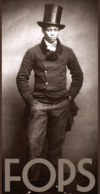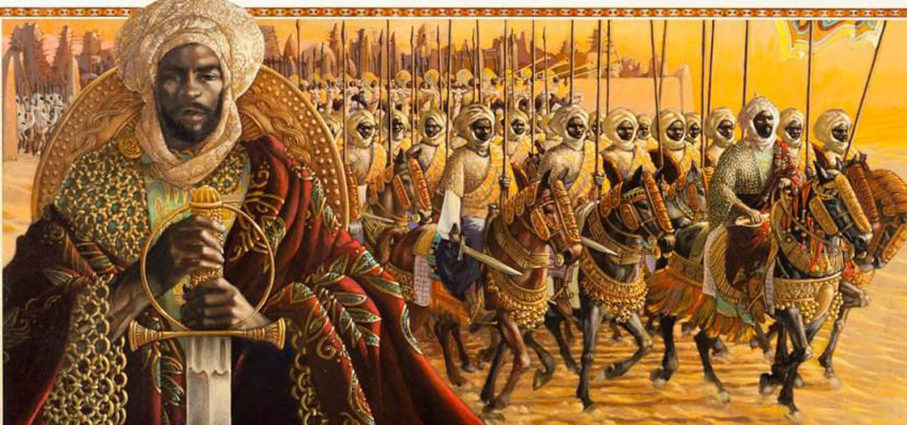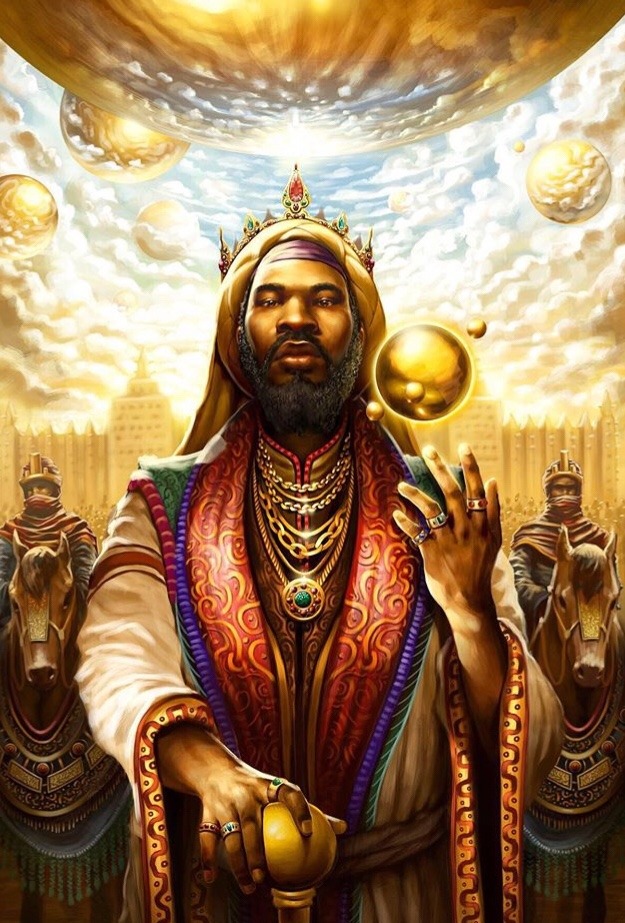From King To Comic: The Story Behind The Real Black Panther, Mansa Musa
February 19, 2018 – 3:19 pm by Xavier Hamilton
When Marvel announced in 2014 that they would begin production on a Black Panthermovie, the news was met with the same kind of hype as an Air Jordan release. Not only would black people get a taste of the positive representation they deserve, Stan Lee (who along with author, Jack Kirby, created The Black Panther comics) would be bringing to “life” the richest and one of the most powerful protagonists in the Marvel Universe: the Wakandan warrior-king, T’Challa.
The excitement surrounding the film can be credited to the unprecedented nature of the Black Panther’s storyline. In the comics, T’Challa is known as the wealthiest man in the world with a fortune that makes Ironman look rusty. He’s also the leader of an advanced African nation. This power, coming from where America’s 45th president once called one of its countries a “sh**hole,” strikes some as more fantasy-like than people with laser swords. Yet, this is only because American exceptionalism deprives its citizens of worldly history, as the story of T’Challa is eerily similar to the legend of a historic African ruler. While it would be wrong to discredit the creativity of the author, when informed, one can’t help but insist that the talents of Black Panther’s main character aren’t as original as they seem.
“Everything that’s out here for kings like us – the reason why we like this jewelry and this diamond and this stuff – they don’t understand is because we really from Africa. We originated from Kings… it’s in our genes. We just don’t know our history.” – Pimp C
In fact, long before Wakanda was imagined, the real Black Panther once ruled the lands of Western Africa and his name was Mansa Musa.
Like his fictional counterpart, Musa was loaded. With an estimated net worth close to $400 billion, TIME states that Mansa Musa was “richer than anyone could describe.” It was actually these riches that brought the world’s attention to his power, as it was his 1324 pilgrimage to Mecca that made Musa a household name.
Mansa Musa treated this trip like a Puff Daddy video shoot. He and 60,000 of his guys wore nothing but silk and traveled from Western Africa to Mecca. They spent more money along the way than the world had ever seen. Yet, it was almost as if the ruler’s ethos blended JAY-Z’s “Money Ain’t A Thing’” with “The Story of O.J.” as he donated as much as he splurged. As a matter of fact, according to Britannica, Musa gave the poor so much gold that his charitable actions caused the world a massive inflation. He crashed the world market in such a monsterous way that it took the city of Cairo 12 years to recover.
However, wealth isn’t the only place where Musa and T’Challa correlate. When comparing their kingdoms, it is clear that Wakanda is a magnified, majestic version of Musa’s Mali empire.
Like Wakanda, Mali and Timbuktu were known for their advanced knowledge and technology. During his reign, Mansa Musa urbanized the city of Timbuktu, making it the blueprint of intellect and infrastructure that it’s known today. This intelligence aided in the country’s military success, which Musa sustained by recapturing the rebellious trading city of Goa. Musa even built the Djinguereber Mosque, one of the three structures making up what is believed to be one of Africa’s oldest learning centers.

This legendary rule is something Mansa Musa couldn’t solely take credit for. As reported by the Gale Database, when asked how he amassed this intellect and success, Musa always referred to his deeply rooted spiritual connections. Being a devout Muslim, Musa was played a major role in the spread of Islam into Africa and southern Spain. He also bigged up his vastly popular cabinet of warriors and scholars, both of which are paralleled by T’Challa’s Black Panther storyline.
“Imma say this then Imma end mines; If you not down for the Africans here in the United States… if you ain’t down with the ones that suffered in South Africa from apartheid and sh*t, you need to step your punk a** to the side…” –Protestor Audio (Dr. Dre’s “The Chronic”)
By projecting the fictional story of T’Challa, people of color are now given the medium to inform others about the real-life greatness of African kings of the past, like Musa I, the Black Panther’s muse. Relating the story of Mansa Musa through this popularized context gives the black posterity an avenue to indirectly identify with not only a comic book character, but also a historical, non-fictional king.
When the connections between Mansa and T’Challa are combined with Black Panther’s box office-breaking record, the economic power of the people, especially black people, is emphasized. From social media festivities to dressing up in traditional African garb for the premiere, it’s safe to say that the Black Panther movie has become a cultural phenomenon. People of color are using monetary support and displaying the modern existence of the economic powers possessed by Mansa Musa and his fictional counterpart.
“Like it or not, you from Africa.” – Tre Styles (Boyz N The Hood)
When this notion is internalized, it will allow the few opponents of the movie to accept the film for what it is, and see that – like Mansa Musa’s pilgrimage – Black Panther has begun to create the inflation needed to showcase the Black Diaspora in a positive light.



